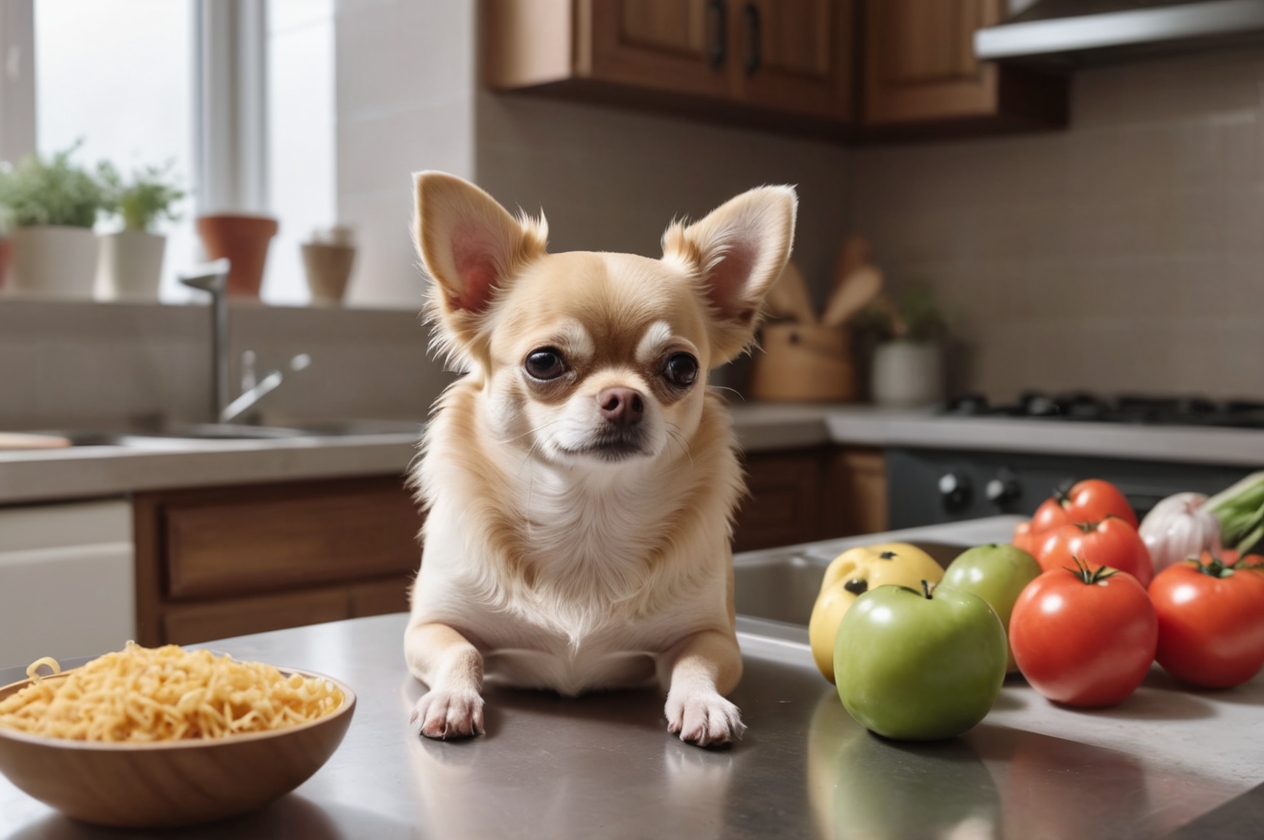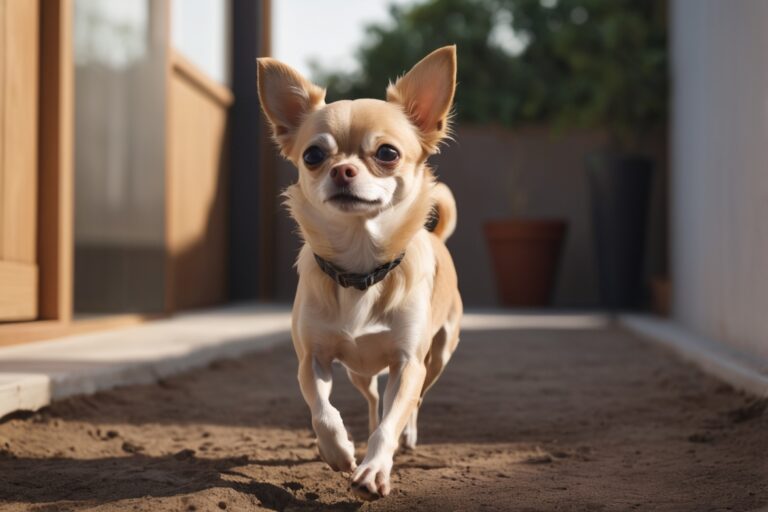Is Your Chihuahua Overweight? A Guide to Healthy Weight Management

Chihuahuas are small dogs with big personalities, but their petite size makes them particularly vulnerable to weight gain. Even just a few extra pounds can put a significant strain on their joints, heart, and overall health. Maintaining a healthy weight is crucial for your Chihuahua’s long-term well-being, but determining if they are overweight and managing their weight effectively requires careful attention to diet, exercise, and lifestyle habits.
In this guide, we will walk through the steps to identify whether your Chihuahua is overweight, explore the common causes of weight gain, and provide practical tips for managing their weight to ensure they stay healthy and energetic.
1. Identifying If Your Chihuahua is Overweight
Determining if your Chihuahua is overweight isn’t always as simple as looking at them—many dogs can carry extra pounds without it being immediately obvious. However, there are several physical signs and techniques that can help you assess your Chihuahua’s weight more accurately. By understanding what to look for and using a combination of visual checks and body condition scoring, you can determine whether your Chihuahua is at a healthy weight or if they need to shed a few pounds.
1.1 Recognizing the Signs of Overweight Chihuahuas
One of the easiest ways to tell if your Chihuahua is overweight is by doing a simple visual and physical assessment. Start by gently feeling along their ribcage. In a healthy-weight Chihuahua, you should be able to feel the ribs easily with a thin layer of fat covering them. If the ribs are difficult to feel or seem buried under a thicker layer of fat, your dog may be overweight.
Another telltale sign is the lack of a defined waist. When you look at your Chihuahua from above, there should be a noticeable waistline that tucks in behind the ribs. If your Chihuahua’s body looks more rounded or cylindrical without this tuck, it’s an indication that they may be carrying extra weight.
Other signs include lethargy, reluctance to exercise, and difficulty getting up or moving around, which can be attributed to the excess weight putting strain on their joints. Additionally, if your Chihuahua pants excessively after minimal physical activity, this could be a sign that their weight is affecting their overall health and stamina.
1.2 How to Measure Your Chihuahua’s Body Condition
One of the most effective ways to assess whether your Chihuahua is overweight is to use a Body Condition Score (BCS). The BCS is a visual and hands-on evaluation tool that ranges from 1 to 9, with 1 being emaciated and 9 being severely obese. A BCS score of 4-5 is considered ideal for most dogs.
To assess your Chihuahua’s BCS:
- Rib Check: As mentioned earlier, you should be able to feel the ribs with a slight fat covering. If you need to press down to feel them, your dog may be overweight.
- Waist Tuck: When viewed from above, your Chihuahua should have a noticeable waist that tucks in behind the ribcage. If there is no waist, or if the abdomen appears distended, it could indicate weight issues.
- Abdominal Tuck: When looking at your Chihuahua from the side, the abdomen should tuck up behind the ribs. If the belly sags or is level with the chest, this is a sign of extra fat around the midsection.
If your Chihuahua scores above a 5 on the BCS, it’s likely time to take action and implement a weight management plan to help them reach a healthier weight.
1.3 Consulting Your Vet for an Accurate Assessment
While at-home evaluations can give you a good idea of whether your Chihuahua is overweight, it’s always best to consult with your veterinarian for a more accurate assessment. Vets have access to precise weighing scales and can evaluate your dog’s body composition more thoroughly, taking into account their breed, age, and activity level.
During the vet visit, your vet may discuss any underlying medical issues that could contribute to weight gain, such as hypothyroidism or metabolic disorders. They can also provide specific guidelines on the number of calories your Chihuahua should consume each day and recommend weight management foods or supplements.
In some cases, your vet might perform tests to rule out medical conditions that can cause weight gain. A comprehensive evaluation ensures that you’re addressing the root cause of the weight problem and helps you develop a tailored weight loss plan for your dog.
2. Causes of Weight Gain in Chihuahuas

Understanding why your Chihuahua has gained weight is an important first step in managing their health. In many cases, weight gain can be attributed to lifestyle factors like overfeeding and lack of exercise, but there are also potential medical causes that need to be considered. By identifying the specific reasons for your Chihuahua’s weight gain, you can take the necessary steps to create an effective plan for weight loss.
2.1 Overfeeding and Inappropriate Portions
One of the most common reasons Chihuahuas become overweight is overfeeding. Due to their small size, even a small increase in calorie intake can lead to weight gain over time. Many owners unintentionally overfeed their Chihuahuas by offering too many treats, table scraps, or feeding portions that are too large for their tiny frames.
Chihuahuas need far fewer calories than larger breeds, so it’s important to measure out their food accurately and stick to recommended portion sizes. Overfeeding often occurs when owners don’t adjust their dog’s food intake based on their age or activity level. For example, a less active Chihuahua needs fewer calories than one that is regularly exercised.
It’s also essential to consider the calories in treats. Small treats can add up quickly, and if they are given frequently throughout the day, they can contribute to weight gain. Treats should make up no more than 10% of your Chihuahua’s daily caloric intake to maintain a balanced diet.
2.2 Lack of Exercise
Chihuahuas are energetic dogs, but they can also become couch potatoes if not encouraged to stay active. Lack of exercise is another major contributor to weight gain in this breed. Without regular physical activity, Chihuahuas are prone to gaining weight, especially as they age and their metabolism slows down.
Daily exercise is crucial for maintaining a healthy weight. Even a short walk around the block, some indoor play, or engaging with interactive toys can help keep your Chihuahua active and burn off excess calories. A sedentary lifestyle not only leads to weight gain but can also cause other health problems such as joint issues and cardiovascular disease.
If your Chihuahua is gaining weight despite being fed the right amount, it’s possible that they need more physical activity to balance out their energy intake. Increasing their exercise routine can make a significant difference in maintaining a healthy weight.
2.3 Health Issues That Contribute to Weight Gain
In some cases, weight gain in Chihuahuas may be due to underlying health issues rather than lifestyle factors. Conditions like hypothyroidism, Cushing’s disease, and certain metabolic disorders can slow down a dog’s metabolism, making it easier for them to gain weight even if they’re eating normally.
Hypothyroidism, in particular, is a common condition that affects the thyroid gland, causing the metabolism to slow down. This leads to weight gain, lethargy, and a decrease in energy levels. If your Chihuahua is gaining weight rapidly or displaying symptoms such as hair loss, lethargy, or changes in appetite, it’s essential to consult with your vet to rule out these medical issues.
Once diagnosed, many of these conditions can be managed with medication and dietary changes, helping your Chihuahua return to a healthier weight.
3. Creating a Weight Management Plan for Your Chihuahua

Once you’ve identified that your Chihuahua is overweight and understand the causes of the weight gain, it’s time to develop a weight management plan. This plan should focus on establishing a healthy diet, increasing exercise, and monitoring progress to ensure that your Chihuahua reaches and maintains a healthy weight. A successful weight management plan requires consistency, patience, and regular adjustments to meet your dog’s individual needs.
3.1 Establishing a Healthy Diet
One of the most important aspects of any weight management plan is adjusting your Chihuahua’s diet to promote healthy weight loss. This usually involves transitioning to a lower-calorie, high-protein dog food specifically formulated for weight management in small breeds. These foods are designed to provide the right nutrients while reducing excess calories, which is crucial for helping your dog shed the extra pounds.
When selecting a weight management dog food, look for options that have high-quality protein sources like chicken or turkey as the main ingredient. These proteins help your Chihuahua maintain lean muscle mass while losing fat. Fiber-rich ingredients, such as sweet potatoes, peas, or brown rice, also support digestion and can help your Chihuahua feel fuller for longer, reducing the likelihood of begging or overeating.
Portion control is critical during this phase. Work with your veterinarian to determine the appropriate number of calories your Chihuahua should consume each day based on their target weight. Use a food scale to measure portions accurately, and avoid free-feeding, as this can lead to overconsumption. Instead, feed your Chihuahua smaller, more frequent meals to keep them satisfied and prevent overeating.
If your Chihuahua enjoys treats, opt for healthy, low-calorie options like baby carrots, green beans, or specially formulated weight-control treats. Keep in mind that treats should only make up about 10% of your dog’s daily caloric intake. Reducing treats or replacing them with low-calorie alternatives is key to controlling their overall caloric intake.
3.2 Increasing Exercise and Physical Activity
Diet alone isn’t enough to help your Chihuahua lose weight—regular exercise is equally important. Increasing your dog’s physical activity level helps burn off excess calories and improves cardiovascular health. While Chihuahuas don’t need intense exercise due to their small size, consistent daily activity is essential for weight loss and overall well-being.
Start by incorporating more walks into your Chihuahua’s daily routine. Depending on your dog’s fitness level, aim for 15-30 minutes of walking twice a day. If your Chihuahua is overweight and hasn’t been exercising regularly, begin with shorter, slower walks, and gradually increase the distance and pace as their stamina improves.
In addition to walks, interactive playtime can help burn calories while keeping your dog mentally engaged. Try games like fetch or tug-of-war, or use interactive toys like puzzle feeders to get your Chihuahua moving indoors. These activities not only help with weight loss but also provide mental stimulation, preventing boredom and reducing undesirable behaviors like excessive barking or chewing.
If your Chihuahua enjoys socializing, consider scheduling playdates with other small dogs to increase their physical activity in a fun, natural way. Swimming is another excellent low-impact exercise option, especially for Chihuahuas with joint problems. The buoyancy of water helps reduce strain on the joints while allowing your dog to get a full-body workout.
3.3 Monitoring Progress and Adjusting the Plan
Consistency is key when it comes to weight loss, but it’s also important to monitor your Chihuahua’s progress regularly to ensure the plan is working. Weigh your dog weekly to track their weight loss, and keep a journal of their food intake and exercise routines to identify any patterns or areas for improvement.
If your Chihuahua isn’t losing weight as expected, it may be necessary to adjust their diet or exercise plan. Consult your vet if you’re unsure whether your dog’s progress is on track. They may recommend further reducing portion sizes, switching to a different weight-control food, or increasing the intensity or duration of exercise.
It’s important to remember that weight loss should be gradual and steady—rapid weight loss can be unhealthy and stressful for your dog. Aiming for a loss of 1-2% of body weight per week is a healthy and sustainable goal. Celebrate small victories, such as reaching a weight milestone or noticing increased energy levels in your dog.
As your Chihuahua approaches their target weight, it’s essential to maintain the healthy habits you’ve established during the weight loss process. Continue monitoring their diet and activity levels to prevent weight regain, and make any necessary adjustments to keep them at a healthy, stable weight.
4. Maintaining a Healthy Weight Long-Term

Once your Chihuahua has reached a healthy weight, the work isn’t over—maintaining that weight is just as important as losing it in the first place. Preventing weight regain requires a balanced diet, regular exercise, and ongoing monitoring to ensure your dog remains in good health. By sticking to healthy habits and making minor adjustments as needed, you can help your Chihuahua maintain a healthy weight for life.
4.1 Avoiding the “Yo-Yo” Effect
The “yo-yo” effect, where weight is lost and regained repeatedly, can be harmful to your dog’s health. To avoid this, it’s crucial to maintain the healthy diet and exercise routines that helped your Chihuahua lose weight in the first place. Continue feeding them appropriate portion sizes, and avoid slipping back into old habits of overfeeding or excessive treat-giving.
It’s also important to keep an eye on your dog’s activity level. As Chihuahuas age, they may become less active, which could lead to gradual weight gain if their diet isn’t adjusted accordingly. Regular exercise, even in older dogs, is essential for maintaining muscle mass, cardiovascular health, and preventing obesity.
4.2 Healthy Treat Alternatives
While it’s important to keep your Chihuahua’s treat intake in check, that doesn’t mean you have to eliminate treats altogether. Instead, focus on healthy, low-calorie alternatives that provide nutritional benefits without contributing to weight gain. Options like baby carrots, green beans, apple slices (without seeds), or specially formulated low-calorie dog treats can be rewarding without adding unnecessary calories.
Use treats as a tool for training or positive reinforcement, but be mindful of portion sizes. Breaking treats into smaller pieces allows you to reward your dog frequently without overfeeding. Additionally, you can try incorporating non-food rewards, such as playtime or affection, to reinforce good behavior without the need for treats.
4.3 Regular Vet Checkups and Weight Monitoring
Ongoing vet checkups are essential for maintaining your Chihuahua’s healthy weight long-term. Regular weigh-ins at the vet can help catch any gradual weight gain before it becomes a significant issue, allowing you to make adjustments to your dog’s diet and exercise plan as needed.
During these visits, your vet can also assess your Chihuahua’s overall health, including joint health, heart function, and any age-related issues that might impact their ability to stay active. Routine checkups help ensure that your Chihuahua stays healthy and avoids the common health problems associated with being overweight.
By following a structured, long-term plan and staying vigilant about your Chihuahua’s diet and activity levels, you can help them maintain a healthy weight for years to come.






